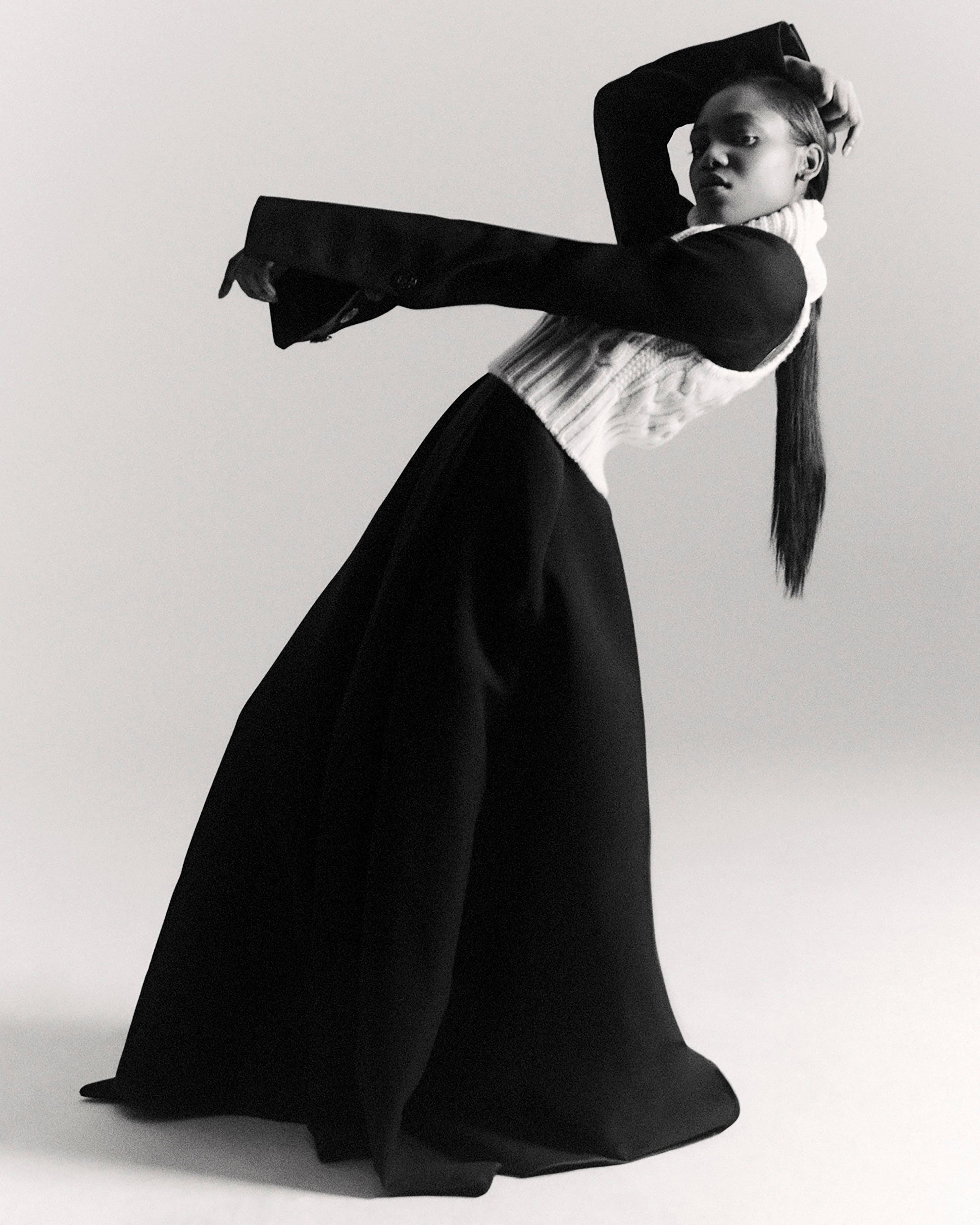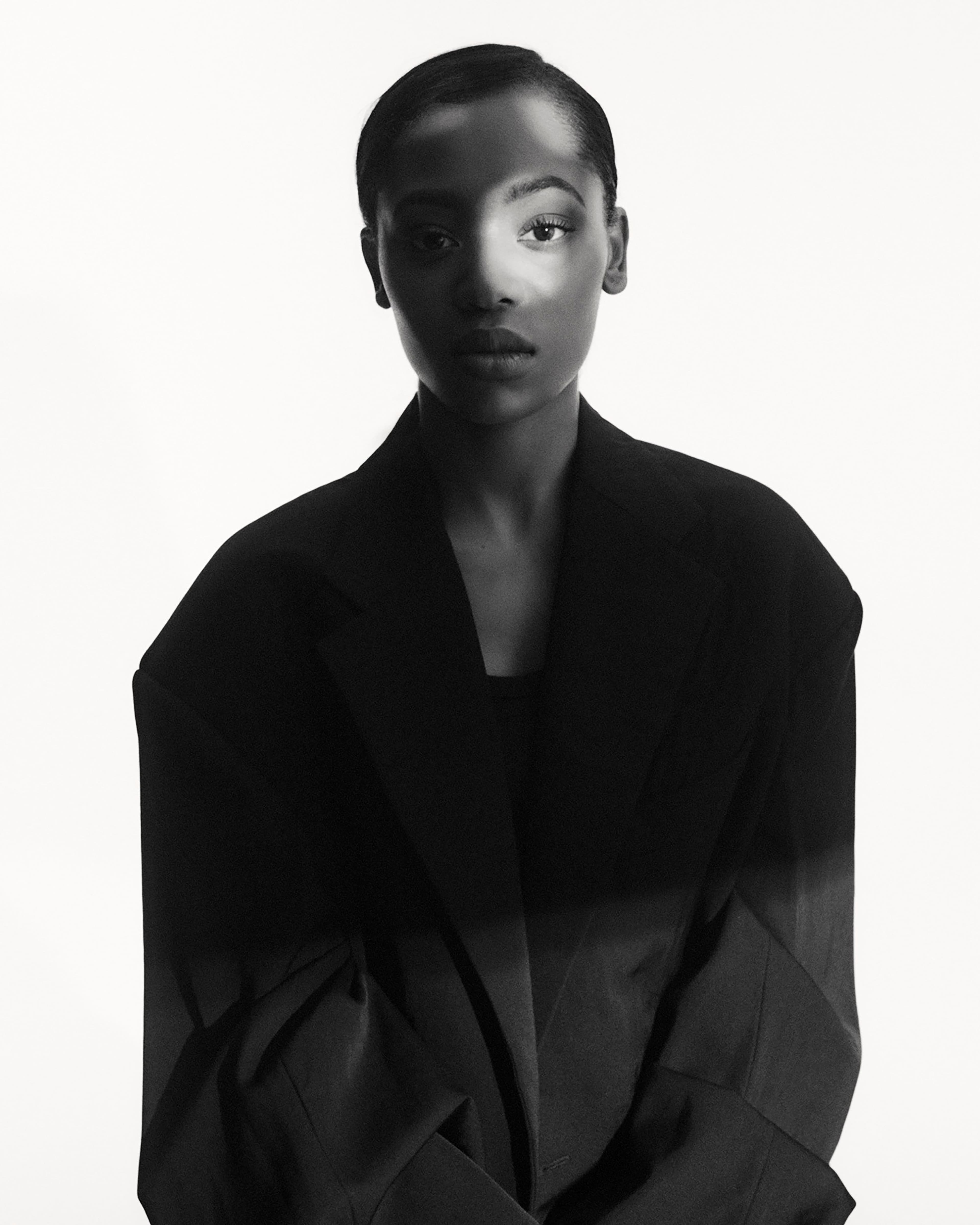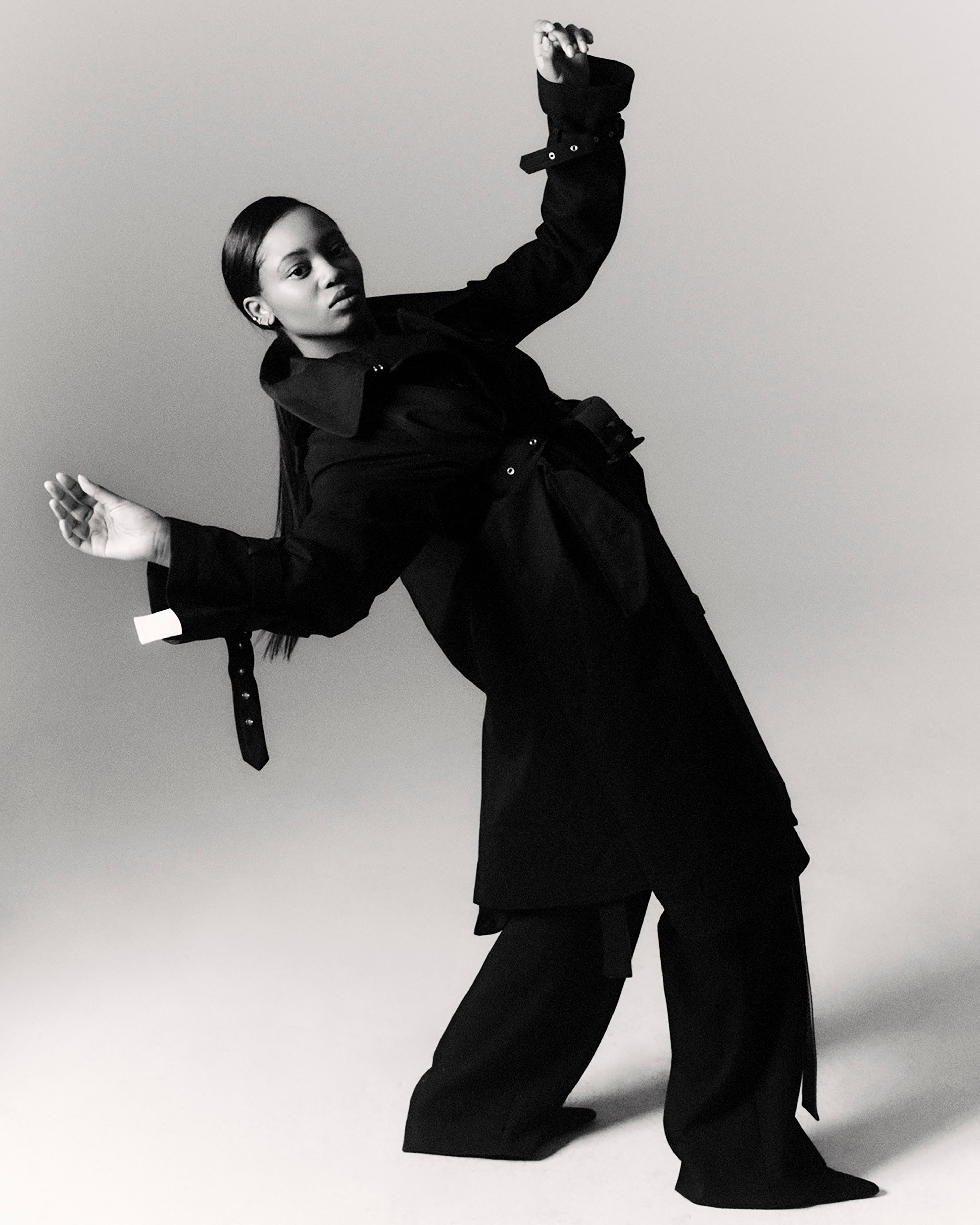
Sweater by Sacai. Dress by Christian Dior. Shoes, worn throughout, by Khaite.
Hailey Kilgore Breaks Through On Screen
On a hot day in early June, before the summer solstice and on one of 2021’s longest days, Hailey Kilgore is getting settled in her new home in a quiet part of New Jersey. She and her dog, Pumpkin, just moved in. The space—according to my Zoom screen view—is clean, bright, and full of unpacked boxes. Sitting in the middle of it, with excellent posture and a wide-eyed, endearingly eager expression, is the actress herself.
Kilgore, who was nominated for a Tony for her performance in the 2017 Broadway revival of Once On This Island, is making her feature film début as Carolyn Franklin, a singer, songwriter, and Aretha’s sister, in the new biopic Respect. She speaks like you might expect a Broadway performer to: with volume and a touch, here and there, of added flair in her clearly enunciated words. She’s also so physically expressive that in the audio-only playback, I find myself wondering if I’m really listening to the same person. This—the way she uses her hands, her whole body to express herself—might be predisposed. Raised in a musical home with her adoptive parents (both theater performers), Kilgore can’t remember a time in her life without music. “Music has always been with me,“ she says. Music, and a love of the stage: Kilgore’s taste for performance began early in elementary school in her hometown of Portland, Oregon, when she was cast as a young Alice in Wonderland in a school play. She recalls the experience with a smile. “During my first scene, everyone was laughing and enjoying what I was doing,“ she says. “I remember thinking, ‘I could get used to this feeling.’“
In high school, Kilgore was performing locally and working so much that, a year and a half in, she had to switch to online courses. She graduated early that way, already with years of acting experience under her belt. Her first big break came about halfway through college. Michael Arden, who directed Once On This Island, was in the middle of a search for an actress to play the musical’s lead, Ti Moune, and called her up. Thanks to a Kilgore family friend who knew Arden, he’d seen a YouTube video of a young Hailey, singing into a hairbrush in her bedroom. He asked if she might audition; she did—and got the part. By the time Once On This Island began, Kilgore was seventeen and had left college for New York City. She spent the next two years as the musical’s fourteen-year-old Ti Moune and ended her run with a Tony nomination. “Those two years really filled in my last two years of college. It was so hard. I was tired, but fulfilled,“ she says. “I’m so grateful that I got to do it, because I have no idea where I would be if I hadn’t.“

Trench coat by Sacai. All jewelry throughout by Repossi.
In Kilgore’s case, a love of the stage does not seem to equal a desire for personal attention or fame. Instead, from the way she describes her approach, it is about leaving ego behind. “I have always been for and of people who can transform,“ she explains. “In 2021, when everybody is so about themselves and their image, I really love people who are willing to explore and imagine.“ She doesn’t appear to apply this description to herself yet, but Kilgore strikes me as one of these: a transformer.
Take her role in Respect. Cast alongside Jennifer Hudson—who captured Aretha Franklin’s character in a way it would be hard to envision anyone else coming close to—as Carolyn, Kilgore approached the role with a seriousness and meticulousness worthy of someone well beyond her twenty-two years. “It starts with weeks and weeks of table work,“ she says of her “crazy weird“ process. She’ll beg for access to scripts, background information, in-person meetings with showrunners, producers, directors, and anything (anyone) else she can get her hands on, as early as she can possibly get her hands on them. This in order to “completely destroy and deconstruct a character.“ The role of Carolyn in Respect, which is small but impactful and emotionally charged, is a clear reflection of this process. When asked to describe her, Kilgore’s eyes light up. She is the most talkative she’s been yet in our conversation: “Carolyn Franklin,“ she says, “was a deep, deep, deep chick.“
Carolyn was the youngest Franklin sister, quiet, but outspoken in crucial family moments. In the film (and life), her talents are recognized but rarely realized in their own right. Instead, most of her success came from writing for Aretha. “Ain’t No Way,“ one of Aretha’s most popular love songs, is the centerpiece of a poignant scene between the two sisters in the film and was written by Carolyn— according to one theory Kilgore recounts, about Carolyn’s own lesbian lover. Recognized today as an LGBTQ+ artist, in the Sixties, she kept under the radar. “She didn’t say much,“ Kilgore says thoughtfully. “She didn’t have to. Unless she was calling out her sister“—which she did, the actress says, “on a lot of things. She kept Aretha very grounded.“ In Respect, Carolyn urges Aretha to leave her abusive husband and manager, Ted White; intervenes during Aretha’s lowest moments with alcohol; and gets up in the middle of the night with Aretha to sing alongside both her sisters. Carolyn died at the age of forty-three of breast cancer.

All clothing by Balenciaga
Kilgore says she still loves listening to Carolyn’s albums. She laughs at the fact that she spent more time while filming Respect as Carolyn than she did as Hailey Kilgore. She sees leaving herself to become someone else for months at a time as an opportunity to learn and as vital to her career, especially in roles as powerful as this one. Carolyn “was one of the most internal, honest, thoughtful people,“ she says. “I think she made me more that way—more internal.“ The working relationship with Jennifer Hudson (or “Jen,“ as Kilgore refers to her) also reflected the relationship between the two characters. “It felt like she was my big sister,“ she says. “She would gracefully let me come in and hang out with her in her trailer. We would hang out, and I would ask for advice. It was so cool to be working with one of my idols,“ she finishes, adding, “but they’re people, you know?“
Kilgore credits her insightfulness to her upbringing. “I grew up around service,“ she says. “My dad would always tell me, even when I moved here for college, ’Try and find some way to serve. It will keep you centered.’“ And she says it does. When the pandemic hit, she had temporarily wrapped filming Starz’s new Power Book III: Raising Kanan, which premiered in July. In the series—a spinoff of the platform’s original Power—she plays Jukebox, a fiercely independent, determined teenage musician and close friend to the show’s title character. Almost as soon as filming paused, alongside a group of people she describes as a “badass team,“ she helped to create a nonprofit Broadway event called Project Sing Out!, a one-night concert that raised money for schools and theater programs for low-income communities and communities of color. “I’m so proud that we did that,“ she smiles.
Now Kilgore says she is just happy to be here. “I’m so excited,“ she says. While we wait to see what she’ll do next, she’s happy to take on a challenge, to push herself. “I can’t not do theater,“ she tells me. “I have to be on stage.“ But she means film, too: Respect is just the beginning. “As a young African-American woman trying to navigate where I fit in this industry—there is such a stereotype for young Black artists, still. I’m trying to broaden that by just doing what I know how to do best.“
Respect is out now. Power Book III: Raising Kanan continues on Sundays on Starz. Read this story and many more in print by ordering our Summer 2021 issue here.

Trench coat by Sacai. Pants by Officine Générale.
As a nonprofit arts and culture publication dedicated to educating, inspiring, and uplifting creatives, Cero Magazine depends on your donations to create stories like these. Please support our work here.






